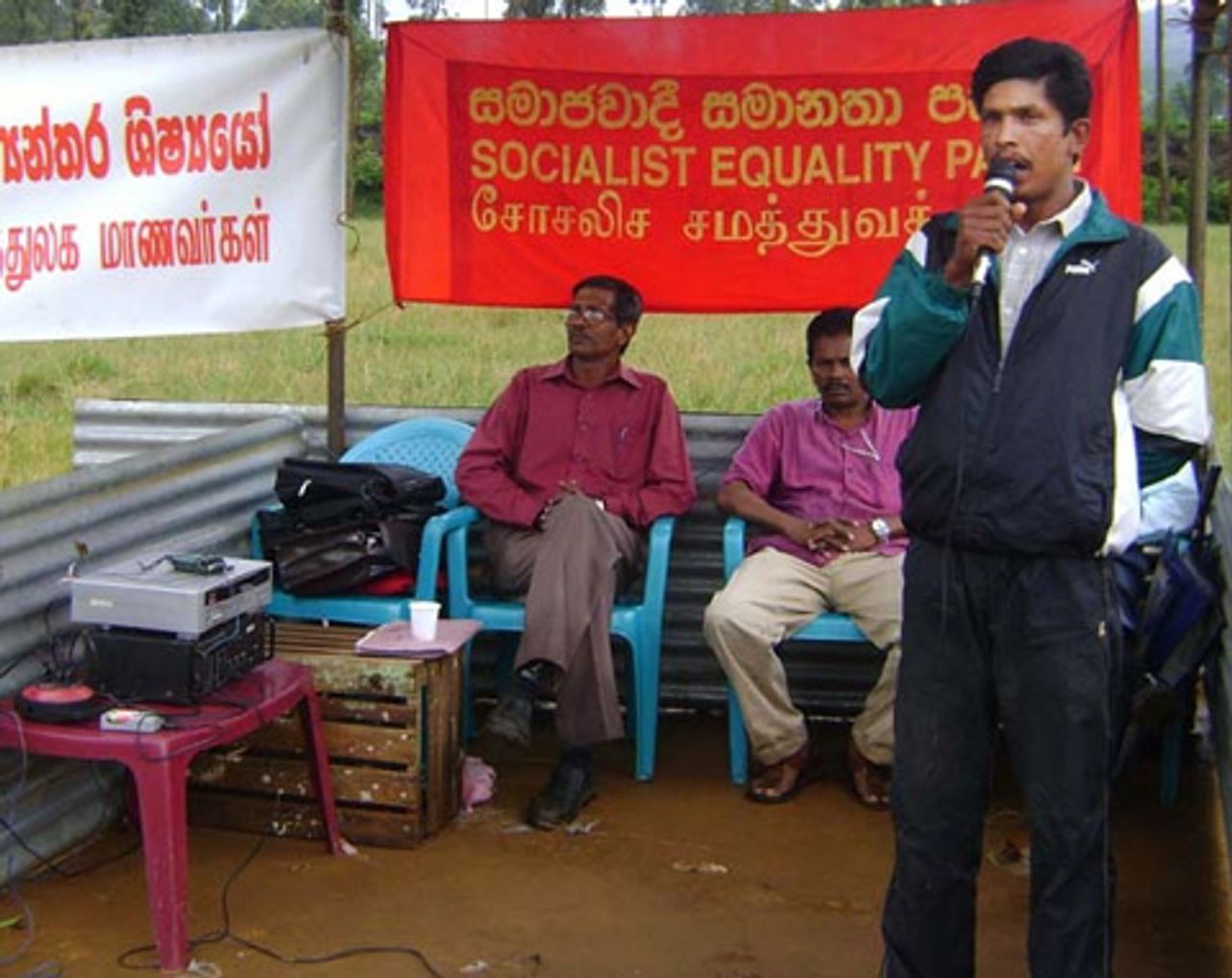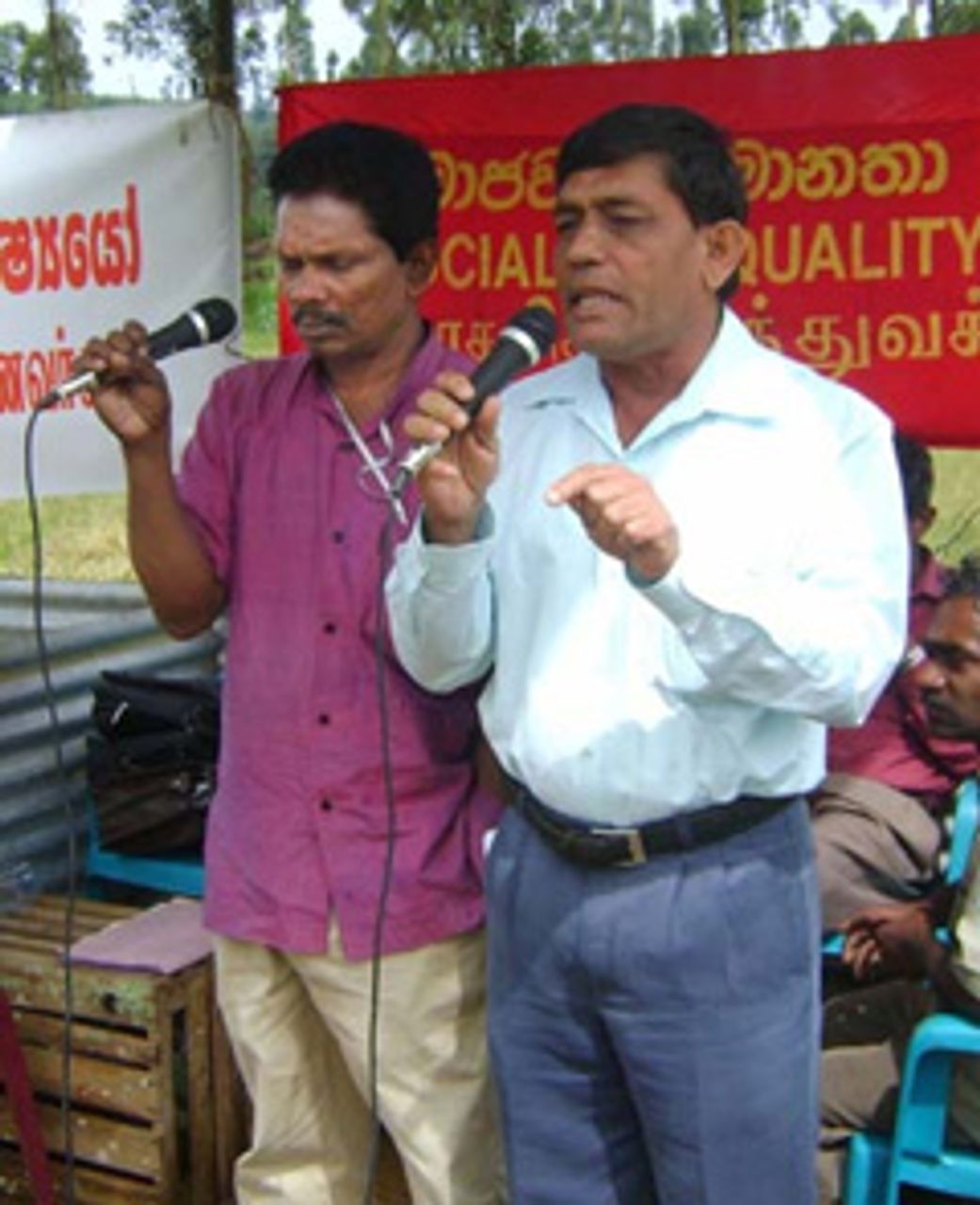The Socialist Equality Party (SEP) and the Balmoral Estate Action Committee held an important open-air meeting at Agarapathana in Sri Lanka’s central plantation district on November 15 to discuss the lessons of the recent plantation workers’ struggle.
The action committee was formed in late September with the SEP’s political assistance by tea workers from the Balmoral Estate who opposed the sell-out being prepared by the trade unions. The Ceylon Workers Congress (CWC) and two other unions were helping plantation companies to impose another poverty-level wage agreement. Other unions such as the Up-country Peoples Front (UPF) and the All Ceylon Plantation Workers Union (ACPWU) postured as opponents, but only to contain widespread anger among plantation workers.
The SEP and Balmoral Action Committee members campaigned jointly for the meeting among workers at several estates, including Glasgow, Balmoral, New Ford and Henfold, and in small towns in the area. Thousands of leaflets, featuring an appeal by the Balmoral Action Committee, were distributed.
The meeting was held at Agarapathana’s Holbrook Ground despite attempts by the Balmoral Estate management, trade unions and police to intimidate members and supporters of the Action Committee. Fearful that other workers would establish their own independent action committees, area leaders of the UPF and National Union of Workers (NUW) actively sought to bully workers into not attending. Attempts were made to bribe Action Committee members. On the day of the meeting, the NUW sent representatives to try to prevent workers from taking part.
The local police also harassed Action Committee members, visiting the Balmoral Estate to question them. On the day of the meeting, three officers from the police intelligence unit arrived at the ground to spy on participants, but left after being challenged. Two days after the meeting, the police called in Action Committee member Gurunathan under the guise of seeking information about a theft. He was released after the SEP intervened.
A number of workers attended and stayed despite heavy rain to hear SEP and Action Committee speakers. One worker commented after the meeting: “A lot of pressure was put on workers to prevent them participating. But I think the meeting was good. I learned a lot and those ideas should be spread among workers. Continue the good work.”
Leading SEP member A. Shanthakumar chaired the meeting and briefly outlined the SEP’s history and fundamental differences with other political parties and the trade unions. He reviewed the experiences of workers during the 2006 strike, which was betrayed by all the unions, as well as the latest pay agreement. In both cases, when workers defied the unions and took action, the unions collaborated with the police and management to witch-hunt workers and youth.
 Action committee president V. Thanrajah
Action committee president V. ThanrajahAction Committee president V. Thanaraj said: “Minister Chandrasekaran [the UPF leader] said his union would oppose the collective agreement [signed by CWC with employers]. Some other unions promised a big struggle after the Deepavali festival [a Hindu festival on October 17], but they did nothing.
“We are paying subscriptions to these unions, but what is the use of them? They cheat us. We heard that the president [Mahinda Rajapakse] said he was going to increase our salaries. How can we believe that? When we were betrayed by the unions, the SEP gave us strength. As we are workers, we don’t want to fear for anything. We have to fight for the unity of workers to defend our rights. Our action committee appeal explains what workers should do.”
SEP political committee member M. Thevarajah explained that management, the police and local unions had all united to pressure, harass and intimidate Action Committee members. They feared that workers would follow their initiative and start to break from the unions, turn to politics and take the struggle into their own hands. “One important lesson of the 2006 and 2009 struggles is that all the trade unions—not only those that signed the deal, but those who claimed to oppose it—defend the profit system, not the interests of workers,” he explained.
“I asked the UPF secretary S. Vijay Kumar what happened to the fight the UPF promised against the collective agreement. He immediately blamed workers, falsely saying they were not ready to fight. But the UPF banned its members from joining even the limited work-to-rule campaign. UPF leader P. Chandrasekaran is a cabinet minister in the Rajapakse government. These bureaucrats defend the government and the profit system and their own privileges. It is the same with the other unions that criticised the wage agreement.”
Thevarajah explained that the betrayal of the unions flowed from the collapse of the perspective of pressuring the government and management for concessions. Around the world, the trade unions had become industrial policemen for companies and governments and their demands that workers had to be “competitive”. He pointed out that workers were now being driven into struggle against the capitalist system itself, and for that a socialist program and leadership were necessary.
 W.A. Sunil (right) addressing the meeting
W.A. Sunil (right) addressing the meetingSEP political committee member W.A Sunil delivered the main report to the meeting. “The lessons we are discussing at this meeting are not limited to plantation workers but are relevant for workers throughout Sri Lanka and internationally. The sell-out deal signed by the CWC and later accepted by all the unions that claimed to oppose it has proved that workers cannot defend any of their rights through the unions.”
He pointed out that workers demanding pay rises in the state-owned sectors—electricity, the water board, petroleum and the ports—had similar experiences. The unions limited the campaign to work-to-rule bans to pressure the government, but Rajapakse had already ruled out any immediate wage rise. “Workers are objectively in a political struggle against the government, but the trade unions are blocking this struggle,” he said.
Sunil explained that the constant inroads into the living standards of the working class were a product of the global economic crisis, which was evident in the Sri Lankan tea industry. “Under the increasing competition between Sri Lanka and other tea-producing countries like Kenya, India, China and Bangladesh, Sri Lankan companies are desperate to protect their profits. To defend their living standards, Sri Lankan workers have to unite with their international class brothers.”
Sunil drew attention to the Rajapakse government. “Decades of huge defence spending for Colombo’s communal war and the unfolding world recession have intensified the government’s crisis. It is not in a position to make any concessions to working people and the rural poor. It is carrying out continuous attacks on living conditions, jobs, public education and health.
“The deepening dispute between the Rajapakse government and General Sarath Fonseka, who was a member of the ruling clique, is a warning to the working class. Rajapakse will not hesitate to suppress the struggles of working people. However, a significant section of the capitalist class thinks that stronger rule is needed to deal with the intensifying class struggle,” Sunil said.
Sunil explained that these developments in Sri Lanka were taking place in the context of a deepening world recession not seen since the Second World War, developing inter-imperialist rivalry and militarism. He highlighted US imperialism’s wars in Iraq and Afghanistan.
“This underscores the need for the working class to fight for a socialist perspective to defend their jobs, living conditions and democratic rights. Workers must break from the trade unions that have become the instruments of employers, and from all the major parties. Sinhala, Tamil and Muslim workers must unite and fight for a Socialist Republic of Sri Lanka and Eelam as a part of the struggle for socialism in South Asia and internationally.”
Sunil concluded the meeting by urging workers to join and build the SEP.
